In spite of the fact that women had had their irrefutable place in rock music since its inception, their creative contribution had not received much attention. Rock'n'roll was considered a rather male domain. Topics addressed in the lyrics focused around the male view of the world, although women often entered them as a significant source of inspiration. For the time being, women mainly performed in bands as singers and, only to a lesser extent, as instrumentalists. This started to change in the first half of the 1990s when strong female authors emerged on both sides of the Atlantic, either as front people of bands or performing solo.
In spite of the fact that women had had their irrefutable place in rock music since its inception, their creative contribution had not received much attention. Rock'n'roll was considered a rather male domain. Topics addressed in the lyrics focused around the male view of the world, although women often entered them as a significant source of inspiration. For the time being, women mainly performed in bands as singers and, only to a lesser extent, as instrumentalists. This started to change in the first half of the 1990s when strong female authors emerged on both sides of the Atlantic, either as front people of bands or performing solo.
Björk works with completely different means of expression. With the Debut album, she drew a thick line behind her past as a rock singer and opened the door to the world of boundless creativity that adorns her work. Her songs have the form of dance electronics, atmospheric trip-hop, and are also inspired by jazz, and her fans could only guess where she would go from there.
***
On the back cover of Songs of Faith and Devotion, the Mute label logo stands out proudly. It was founded in 1978 in London by Daniel Miller, an ardent fan of the sound of synthesizers, as well as, at that time, still nascent electronic music. Originally, it was only to be used for the release of his own, self-recorded, single. Emboldened by the unexpected success of the record as well as the subsequent discovery of other musically related artists, he launched Mute as a regular label a year later.
The turning point in the label's history came when he signed a contract with Depeche Mode. From the beginning, their popularity grew with each subsequent record and spread beyond the borders of the British Isles. In an effort to give the band adequate support, the label expanded along with it. Daniel Miller recognised the importance of mutual loyalty in building a long-term relationship between the publisher and the artist. This approach bore him fruit. The artists remained loyal to the label even when more lucrative offers came knocking on their doors and, thus, helped it survive even during less favourable times. In the course of the '80s, Mute became one of the leading labels not only of synth pop, but also of experimental electronic music, not avoiding bands with traditional instrumentation either. From the fertile ashes of the wild post-punkers The Birthday Party, who recorded their last album under their banner, rose Nick Cave and his The Bad Seeds, as well as the no less harrowing Crime & the City Solution. After leaving Depeche Mode, Vince Clarke continued to churn out hits with Yazoo, while Recoil, Alan Wilder's solo project, spun more demanding electronic textures. Nonetheless, they all continued to defend Mute's colours, where no one was favoured. The political provocateurs Laibach, the industrial noisemakers Einstürzende Neubauten, and the pioneers of electronic body music Nitzer Ebb all enjoyed equal attention. Regardless of the amount of expected sales or genre affiliation, the underappreciated dance floor burners Renegade Soundwave, the retro rockers of Inspiral Carpets, and the electronic sound magician Moby all worked side by side.
With regained independence, a sense of musical adventure never lost, and despite their name, Mute have something to say to this day.

PJ Harvey – Man-size (Zebra)
A simple guitar riff which twines like a snake around the whole song and creates a musical mantra. The ability to arrange maximum effect in minimum space, where the lyrics are supporting pillars. The sarcasm is lightened by humour. Polly Jean is simply a quality writing investigative journalist, of her own soul. Of man-size.
Depeche Mode – I Feel You (Kubsson)
Sometimes you take notice of a band because you hear about them everywhere, but you do not pay attention. But a breaking point might come and pull down the barrier of your disinterest. For me, it was their riff pumping the electrifying tension. When tension of a very different kind, provided by the fascinating Emmanuelle, joined in, DM had me in their pocket.
Morphine – Buena (Rasťo)
They did not choose their name accidentally, they are equally addictive. A two-string bass, a saxophone, drums, and a VOICE. With minimal presence of instruments, they were able to create an unbelievably strong, almost palpably thick, atmosphere. In a dangerous combination with the singer's bewitching baritone, their music has the ability to absorb me completely.
Click here to find out where to get the book
The next sample is from the chapter dedicated to 1994